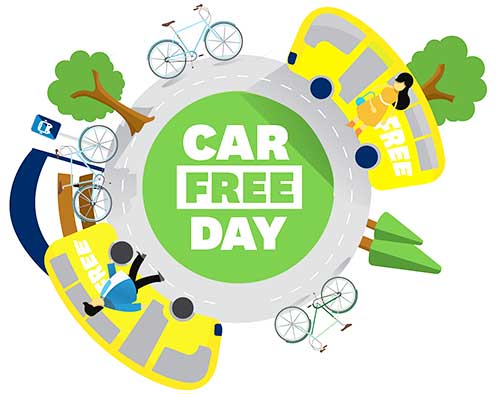
World Car Free Day is celebrated globally on September 22, encouraging cities and citizens to step away from their cars for a day and embrace more sustainable forms of transportation. This day is a global initiative to reduce carbon emissions, ease urban traffic congestion, and promote healthier, greener cities by encouraging walking, cycling, public transportation, and other eco-friendly commuting methods.
As urban populations grow and vehicles on the road increase, the environmental and social impacts of car-dependent lifestyles become more pronounced. World Car Free Day is a powerful reminder of the benefits of reducing car usage, and it provides a glimpse into what a more sustainable, less congested city could look like.
The History and Purpose of World Car Free Day
World Car Free Day has its roots in the Car Free Movement that began in the early 1990s. The first formal events took place in European cities like Reykjavik, Iceland, and La Rochelle, France, which aimed to raise awareness about the growing challenges posed by car dependency, including air pollution, noise pollution, and urban sprawl. By encouraging alternative transportation, these early movements sought to reclaim public spaces for people, not just cars.
The United Nations and other global organizations have since embraced World Car Free Day, recognizing its potential to combat climate change and promote healthier urban environments. Every year, cities around the world participate by closing off streets to cars, organizing community events, and encouraging citizens to leave their cars at home.
Environmental Benefits of Going Car-Free
The environmental impact of cars is significant. Motor vehicles are responsible for many global carbon dioxide (CO2) emissions, contributing to climate change and air pollution. By reducing the number of cars on the road, even for just one day, the positive effects on the environment can be profound. Here are a few key environmental benefits of World Car Free Day:
Reduced Carbon Emissions: Transportation is one of the leading contributors to greenhouse gas emissions. People can significantly reduce their carbon footprint by using public transport, cycling, or walking.
Improved Air Quality: Car emissions contribute to poor air quality, especially in densely populated urban areas. By minimizing car usage, cities can see a notable improvement in air quality, benefiting public health.
Less Noise Pollution: The constant sound of engines and traffic can lead to noise pollution, which impacts mental well-being. World Car Free Day creates a quieter, more peaceful urban environment, even if only for a day.
Energy Conservation: Cars are highly energy-intensive. Reducing car use can save vast amounts of fossil fuels and other energy resources, contributing to a more sustainable use of resources.
Health and Social Benefits of Car-Free Living
While the environmental benefits of World Car Free Day are clear, the event also highlights the personal and societal advantages of reducing car dependency. Encouraging walking, cycling, and other forms of active transportation can significantly improve public health and overall quality of life.
1. Healthier Lifestyles
One of the most immediate benefits of going car-free is the promotion of more active forms of transport, such as walking and cycling. These activities contribute to improved physical fitness, helping combat sedentary lifestyles linked to numerous health issues, including obesity, heart disease, and diabetes.
Additionally, spending more time outside and engaging in physical activity can improve mental health by reducing stress and anxiety. Cities that promote walking and cycling as primary forms of transport often experience lower rates of chronic illness and better overall health outcomes among their populations.
2. Improved Public Spaces
Without the need to accommodate cars, public spaces can be redesigned to prioritize pedestrians, cyclists, and green areas. Cities that take part in World Car Free Day often close off certain streets to vehicles, transforming them into places where people can walk, cycle, and socialize. This shift helps to reclaim urban areas for community activities, leading to more vibrant, accessible, and enjoyable cities.
3. Reduced Traffic Congestion
Car-free initiatives have the potential to drastically reduce traffic congestion, leading to shorter commute times and less time spent stuck in traffic. A reduction in cars on the road also improves the efficiency of public transportation systems, making buses and trams run more smoothly and on time.
4. Fostering Community Interaction
People who are not isolated in their cars are more likely to interact with others in their community. Walking or cycling, individuals can engage more with their surroundings, leading to stronger neighborhood ties and a greater sense of community. World Car Free Day events, such as street fairs or bike rides, often unite residents and create a shared sense of purpose in promoting sustainable living.
How Cities Participate in World Car Free Day
Around the globe, cities of all sizes participate in World Car Free Day by hosting events, closing streets to traffic, and encouraging citizens to rethink their daily commute. Some notable examples include:
Paris, France: Paris is one of the most high-profile cities to embrace World Car Free Day, with large sections of the city, including the iconic Champs-Élysées, closed to cars. The initiative is part of Paris’s broader effort to combat air pollution and make the city more walkable and bike-friendly.
Bogotá, Colombia: Bogotá is famous for its Ciclovía events, where streets are regularly closed to traffic to make way for cyclists and pedestrians. On World Car Free Day, the city amplifies these efforts, with even more streets dedicated to non-motorized transport.
Jakarta, Indonesia: Jakarta has embraced World Car Free Day as part of its commitment to reducing pollution and traffic congestion. The city closes down major roads and promotes cycling, walking, and public transport as viable alternatives to driving.
New York City, USA: In New York, World Car Free Day is observed with street closures and events that encourage walking and cycling. The day highlights the city’s efforts to reduce reliance on private vehicles and promote sustainability.
How You Can Participate in World Car Free Day
There are many ways to take part in World Car Free Day, whether you're in a city that hosts large-scale events or simply looking to make a small difference on your own. Here are a few ideas:
Leave Your Car at Home: If possible, use public transportation, walk, or bike to your destination. Even carpooling with others can reduce the number of vehicles on the road.
Organize a Local Event: If your city doesn’t officially participate, you can organize a small event with friends, neighbors, or coworkers. Host a group bike ride, walk to work together, or plan a community gathering that encourages car-free living.
Promote the Event on Social Media: Use platforms like Twitter, Instagram, and Facebook to spread awareness about World Car Free Day. Share your experiences and encourage others to participate using hashtags like #WorldCarFreeDay.
Advocate for Sustainable Urban Planning: Get involved in local government or advocacy groups that push for more sustainable urban policies. Whether it's bike lanes, pedestrian-friendly spaces, or better public transport, these efforts contribute to long-term changes that support car-free living.
Looking Toward a Car-Free Future
While World Car Free Day is just one day out of the year, its message is part of a much broader movement toward sustainable urban living. As more cities face challenges related to air pollution, traffic congestion, and climate change, the need for car-free initiatives and more sustainable forms of transportation is becoming increasingly clear.
By celebrating World Car Free Day, we are reminded of the possibilities for a cleaner, healthier, and more sustainable world. Whether through policy changes, community action, or individual choices, we all have a role to play in reducing our reliance on cars and creating cities that prioritize people over vehicles.



